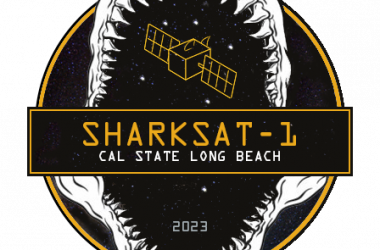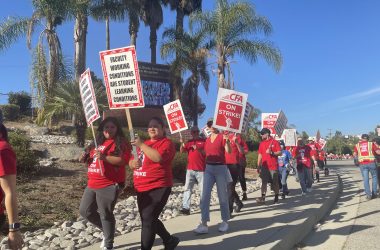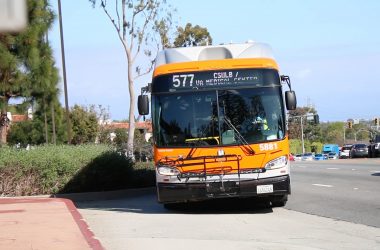The Palestinian Awareness Wall has returned to Cal State Long Beach giving students a chance to look at the Israeli-Palestinian conflict from the Palestinian perspective.
“The wall is something the Israeli’s built along the Gaza strip, and it represents the occupation of Palestinians -— mentally, emotionally and financially,” said Faris Iskandrani, a junior marketing major and Islamic missionary, who has volunteered as an information guide for the wall for three years.
“The wall is an attempt to isolate and control Palestinians, but people built tunnels,” he said.
The display, built on the Friendship Walk in front of the bookstore, was covered with photos and information from the Palestinian perspective of the Israeli-Palestinian conflict.
“Not being too familiar with the conflict, [the wall] is pretty insightful and shocking,” said Chris Tregarthen, a junior kinesiology major.
Most students are in favor of observing another culture and understanding the “other side” of the conflict, Tregarthen said.
“I’ve always been a supporter of knowledge and having [the wall] on campus is a great idea. You really see how these cultures value life,” said Bryce Weiglin, a sophomore English major. “In America there is a bias in the media. It’s good for students to see a different side of the story.”
Near the wall, a 2006 documentary video called “Occupation 101: Voice of the Silenced Majority,” directed by Sufyan Omeish, played on a continuous loop. The documentary about the Israeli-Palestinian conflict focuses on the effects of the Israeli occupation of the West Bank and Gaza Strip and discusses events from the rise of Zionism to the Second Intifada and Israel’s unilateral disengagement plan.
The film won the Golden Palm Award for Best Editing at the 2007 International Beverly Hills Film Festival, and won the Artivist Award for Best Feature Film under the category of Human Rights at the 2006 Artivist Film Festival in Hollywood.
Some students said a major complaint from the Palestinian side of the issue is the unbalanced view of the Israeli-Palestinian conflict.
“The U.S. media only covers one side of the story,” said Thamer Hussein, a mechanical engineering sophomore. “The wall informs students and brings awareness to students.”
Compared to previous years, volunteers for Palestine Awareness Week said they have noticed more support for the wall from students and more curiosity about the conflict.
“I think this gives people a better idea [about the conflict],” said Mohammed Shabaik, a sophomore mechanical engineering major. “Over the years people are getting a better understanding of what’s going on. Right now we’re trying to spread the word, trying to educate and make people sympathize.”
The wall display coincided with CSULB Beach Hillel’s 62nd anniversary of Israel’s establishment. In celebration of this event, the Jewish student organization passed out cake to commemorate Israel’s birthday and answered questions about the Palestinian Awareness wall.
“I’ve been to Israel. I’ve seen it first hand. It’s not genocide. The territories are not Palestinian,” said Joshua Saylor, a junior journalism major and Beach Hillel member. “[The wall] is offensive, people called us Nazi Jews. This is the first time the Jews have had a home and they’re going to defend it.”
Rabbi Drew Kaplan from Socal Jewish Student Services was on campus to celebrate with Beach Hillel and answer questions about the wall.
“People just take [the wall] in. They just absorb it. Some students were bothered by it and then talked to us, they wanted both sides of the story,” Kaplan said. “It’s good that this is on a college campus where both sides are represented.”
Kaplan added that the security fence the Awareness Wall is based on, “is only 4 percent of the wall, the rest is chain link. As the genocide claim goes, the Palestinian population has been increasing.”
At the Beach Hillel table was Lt. Nadav Musay of the Israeli army and supporter of Beach Hillel, who has worked at the security fence back in Israel.
“First, as long as there is the security fence, suicide bombers decrease,” Musay said. “It looks bad but the fence is very important. It brings safety and security to Israel.”
Musay went on to describe the daily activities of the soldiers and people who go through the security fence.
“When normal Palestinian people want to pass they can. There are a lot of checkpoints that a lot of Arabs can go through freely,” Musay said.
When asked how an Israeli soldier determines a “normal” Palestinian, Musay said, “The soldiers standing at the checkpoints have a lot of experience. There’s a specific distance soldiers stand away from the people, a machine checks lug gage, normal citizens pass through, suspicious people are checked out.”
Musay said he supports the right to express free speech at CSULB.
“It’s good to know there are other ways to show thoughts,” Musay said. “This is the good way, not through violence. I read the wall, and I’m sorry to tell you, this represents very little of the whole picture. Students who don’t know will think this is the face of Israel.”
Volunteers with the wall take the stance that the wall represents information for both sides.
“This wall is for education, to be more aware,” said Anees Ur Rehman, a sophomore accounting major. “I feel that this war between Muslims and Jewish is a humanitarian issue and we need to help them.”
Disclaimer: The Daily 49er is not responsible for comments made on www.daily49er.wpengine.com. Persons commenting are solely responsible for comments made on this Web site. The Daily 49er strongly advises individuals to not abuse their First Amendment rights, and to avoid language suggestive of hate speech.



